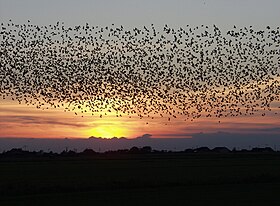List of Phoenicopteriformes by population
| The population of birds |
|---|
 |
This is a list of Phoenicopteriformes species by global population. While numbers are estimates, they have been made by the experts in their fields. For more information on how these estimates were ascertained, see Wikipedia's articles on population biology and population ecology.
Species by global population[edit]
| Common name | Binomial name | Population | Status | Trend | Notes | Image |
|---|---|---|---|---|---|---|
| Andean flamingo | Phoenicoparrus andinus | 38,000[1] | VU[1] | Maximum estimate. The population has been steadily decreasing, and current population is unknown.[1] | 
| |
| James's flamingo | Phoenicoparrus jamesi | 106,000[2] | NT[2] | Estimated value from 2010 census. Actual population will likely be lower due to habitat loss.[2] | 
| |
| American flamingo | Phoenicopterus ruber | 150,000-205,000[3] | LC[3] | 
| ||
| Chilean flamingo | Phoenicopterus chilensis | 300,000[4] | NT[4] | Population is based on census in 2010 which counted 283,000 individuals.[4] | 
| |
| Greater flamingo | Phoenicopterus roseus | 550,000-680, 000[5] | LC[5] | Divided into three separate populations: The Palearctic, stretching from West Africa to Kazakhstan (205,000-320,000); The South West and South Asian (240,000); and the sub-Saharan African (100,000-120,000).[5] | 
| |
| Lesser flamingo | Phoeniconaias minor | 2,220,000-3,240,000[6] | NT[6] | Estimates based on regions include 15,000-25,000 in West Africa, 1,500,00-2,500,000 in East Africa, 55,000-65,000 in South Africa and Madagascar, and 650,000 in south Asia.[6] |
See also[edit]
References[edit]
- ^ a b c d IUCN (2020-08-19). "Phoenicoparrus andinus: BirdLife International: The IUCN Red List of Threatened Species 2020: e.T22697387A182422217". IUCN Red List of Threatened Species. 2020-08-19. doi:10.2305/iucn.uk.2020-3.rlts.t22697387a182422217.en.
- ^ a b c d IUCN (2016-10-01). "Phoenicoparrus jamesi: BirdLife International: The IUCN Red List of Threatened Species 2016: e.T22697398A93612106". IUCN Red List of Threatened Species. 2016-10-01. doi:10.2305/iucn.uk.2016-3.rlts.t22697398a93612106.en.
- ^ a b c IUCN (2020-10-30). "Phoenicopterus ruber: BirdLife International: The IUCN Red List of Threatened Species 2021: e.T22729706A138951737". IUCN Red List of Threatened Species. 2020-10-30. doi:10.2305/iucn.uk.2021-3.rlts.t22729706a138951737.en.
- ^ a b c d IUCN (2018-08-09). "Phoenicopterus chilensis: BirdLife International: The IUCN Red List of Threatened Species 2018: e.T22697365A132068236". IUCN Red List of Threatened Species. 2018-08-09. doi:10.2305/iucn.uk.2018-2.rlts.t22697365a132068236.en.
- ^ a b c d IUCN (2018-08-07). "Phoenicopterus roseus: BirdLife International: The IUCN Red List of Threatened Species 2019: e.T22697360A155527405". IUCN Red List of Threatened Species. 2018-08-07. doi:10.2305/iucn.uk.2018-2.rlts.t22697360a155527405.en.
- ^ a b c d IUCN (2018-08-07). "Phoeniconaias minor: BirdLife International: The IUCN Red List of Threatened Species 2018: e.T22697369A129912906". IUCN Red List of Threatened Species. 2018-08-07. doi:10.2305/iucn.uk.2018-2.rlts.t22697369a129912906.en.

